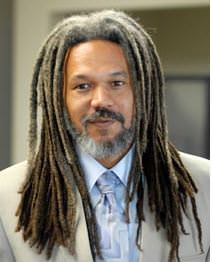2011 Participants
Elizabeth Alexander
 Elizabeth Alexander composed and delivered “Praise Song for the Day” for the inauguration of President Barack Obama. Her latest publication is Crave Radiance: New and Selected Poems, 1990-2010. She has published five other books of poems: The Venus Hottentot (1990), Body of Life (1996), Antebellum Dream Book (2001), American Sublime (2005), which was one of three finalists for the Pulitzer Prize; and her first young adult collection (co-authored with Marilyn Nelson), Miss Crandall’s School for Young Ladies and Little Misses of Color (2008 Connecticut Book Award). Her two collections of essays are The Black Interior (2004) and Power and Possibility (2007), and her play, “Diva Studies,” was produced at the Yale School of Drama. Alexander is the first recipient of the Alphonse Fletcher, Sr. Fellowship for work that “contributes to improving race relations in American society and furthers the broad social goals of the U.S. Supreme Court’s Brown v. Board of Education decision of 1954.” She is the 2007 winner of the first Jackson Prize for Poetry, awarded by Poets & Writers, Inc. and the Anisfield-Wolf Lifetime Achievement Award in Poetry. Other awards include the Quantrell Award for Excellence in Undergraduate Teaching at University of Chicago. She is currently the Thomas E. Donnelley Professor of African American Studies at Yale University and chair of Yale’s Department of African American Studies.
Elizabeth Alexander composed and delivered “Praise Song for the Day” for the inauguration of President Barack Obama. Her latest publication is Crave Radiance: New and Selected Poems, 1990-2010. She has published five other books of poems: The Venus Hottentot (1990), Body of Life (1996), Antebellum Dream Book (2001), American Sublime (2005), which was one of three finalists for the Pulitzer Prize; and her first young adult collection (co-authored with Marilyn Nelson), Miss Crandall’s School for Young Ladies and Little Misses of Color (2008 Connecticut Book Award). Her two collections of essays are The Black Interior (2004) and Power and Possibility (2007), and her play, “Diva Studies,” was produced at the Yale School of Drama. Alexander is the first recipient of the Alphonse Fletcher, Sr. Fellowship for work that “contributes to improving race relations in American society and furthers the broad social goals of the U.S. Supreme Court’s Brown v. Board of Education decision of 1954.” She is the 2007 winner of the first Jackson Prize for Poetry, awarded by Poets & Writers, Inc. and the Anisfield-Wolf Lifetime Achievement Award in Poetry. Other awards include the Quantrell Award for Excellence in Undergraduate Teaching at University of Chicago. She is currently the Thomas E. Donnelley Professor of African American Studies at Yale University and chair of Yale’s Department of African American Studies.
Justin Behrend
 Justin Behrend has been an assistant professor of history at the State University of New York at Geneseo since 2007. He earned his PhD at Northwestern University. His interests are in nineteenth century U.S. history, African American history, and slavery. He recently published an article in the Journal of Southern History on slave political consciousness that was manifested during a Civil War insurrectionary scare. Currently he is working on a book that explores the grassroots political history of freedpeople. It is a case study of the Natchez District, in which he argues that former slaves created a new kind of democracy after emancipation that emphasized diffused power and broad participation. The creation of a resilient governing structure both explains their remarkable political success as well as the violent backlash by white supremacists. The book, entitled Reconstructing Democracy: African Americans in the Making of Democracy in the Post-Civil War South, is under contract with the University of Georgia Press.
Justin Behrend has been an assistant professor of history at the State University of New York at Geneseo since 2007. He earned his PhD at Northwestern University. His interests are in nineteenth century U.S. history, African American history, and slavery. He recently published an article in the Journal of Southern History on slave political consciousness that was manifested during a Civil War insurrectionary scare. Currently he is working on a book that explores the grassroots political history of freedpeople. It is a case study of the Natchez District, in which he argues that former slaves created a new kind of democracy after emancipation that emphasized diffused power and broad participation. The creation of a resilient governing structure both explains their remarkable political success as well as the violent backlash by white supremacists. The book, entitled Reconstructing Democracy: African Americans in the Making of Democracy in the Post-Civil War South, is under contract with the University of Georgia Press.
Brandi C. Brimmer
 Brandi C. Brimmer is in residence at the Freedmen and Southern Society Project at the University of Maryland for the 2011-12 academic year where she focuses on women/gender, race, and sexuality in late-nineteenth-century America. Her book-in-progress analyzes black women’s relationship to the U.S. legal system and to federal institutions during the late nineteenth century. Brimmer has received numerous awards and fellowships for her research. These include a research grant from the Institute of American Cultures at UCLA, an Archie K. Miller Fellowship from the North Caroliniana Society, a Mary Lily research grant from the Sallie Bingham Research Center at Duke University, and a dissertation fellowship from the University of Notre Dame. She was recently awarded a post-doctoral fellowship by the Ford Foundation. Brimmer is a contributor to the second edition of the Black Women in America Encyclopedia (Oxford Press) and The New Encyclopedia of Southern Culture (UNC Press). Her article “Her Claim for Pension Is Lawful and Just” recently appeared in the Journal of the Civil War Era.
Brandi C. Brimmer is in residence at the Freedmen and Southern Society Project at the University of Maryland for the 2011-12 academic year where she focuses on women/gender, race, and sexuality in late-nineteenth-century America. Her book-in-progress analyzes black women’s relationship to the U.S. legal system and to federal institutions during the late nineteenth century. Brimmer has received numerous awards and fellowships for her research. These include a research grant from the Institute of American Cultures at UCLA, an Archie K. Miller Fellowship from the North Caroliniana Society, a Mary Lily research grant from the Sallie Bingham Research Center at Duke University, and a dissertation fellowship from the University of Notre Dame. She was recently awarded a post-doctoral fellowship by the Ford Foundation. Brimmer is a contributor to the second edition of the Black Women in America Encyclopedia (Oxford Press) and The New Encyclopedia of Southern Culture (UNC Press). Her article “Her Claim for Pension Is Lawful and Just” recently appeared in the Journal of the Civil War Era.
Greg Downs

Jim Downs
 An assistant professor of history at Connecticut College, Jim Downs is a historian of the United States. His research examines the history of race and medicine in the 19th century. His forthcoming manuscript, Sick from Freedom: The Deadly Consequences of Emancipation (Oxford University Press), tells the largely unknown story of how disease and sickness shaped the meaning of freedom for ex-slaves after the American Civil War. In the summer and fall of 2010, Downs received the Mayers Fellowship from the Huntington Library in Pasadena, CA. In 2009, he was awarded a fellowship from the Gilder Lehrman Center at Yale University; an Andrew Mellon fellowship from the Massachusetts Historical Society, and a summer institute fellowship from the National Endowment for the Humanities. His future research projects include a study of sexuality during the 19th century and an in-depth investigation of the international reaction to the American Civil War. Downs has published a number of articles and edited two books, Why We Write: The Politics and History of Writing for Social Change, Routledge, 2006, and Taking Back the Academy: History of Activism, History as Activism (co-edited with Jennifer Manion), Routledge, 2005.
An assistant professor of history at Connecticut College, Jim Downs is a historian of the United States. His research examines the history of race and medicine in the 19th century. His forthcoming manuscript, Sick from Freedom: The Deadly Consequences of Emancipation (Oxford University Press), tells the largely unknown story of how disease and sickness shaped the meaning of freedom for ex-slaves after the American Civil War. In the summer and fall of 2010, Downs received the Mayers Fellowship from the Huntington Library in Pasadena, CA. In 2009, he was awarded a fellowship from the Gilder Lehrman Center at Yale University; an Andrew Mellon fellowship from the Massachusetts Historical Society, and a summer institute fellowship from the National Endowment for the Humanities. His future research projects include a study of sexuality during the 19th century and an in-depth investigation of the international reaction to the American Civil War. Downs has published a number of articles and edited two books, Why We Write: The Politics and History of Writing for Social Change, Routledge, 2006, and Taking Back the Academy: History of Activism, History as Activism (co-edited with Jennifer Manion), Routledge, 2005.
Carole Emberton

Eric Foner
 Eric Foner is the DeWitt Clinton Professor of History at Columbia University. He has served as president of the Organization of American Historians, the American Historical Association, and the Society of American Historians. Foner’s publications have concentrated on the intersections of intellectual, political and social history, and the history of American race relations. His best-known books are: Free Soil, Free Labor, Free Men: The Ideology of the Republican Party Before the Civil War (1970; reissued with new preface 1995); Reconstruction: America’s Unfinished Revolution, 1863-1877 (1988) (winner, among other awards, of the Bancroft Prize, Parkman Prize, and Los Angeles Times Book Award); and his most recent book, The Fiery Trial: Abraham Lincoln and American Slavery (winner, among other awards, of the Bancroft Prize, Pulitzer Prize for History, and The Lincoln Prize), which was published in the fall of 2010. Foner has also been the co-curator of two prize-winning exhibitions on American history: A House Divided: America in the Age of Lincoln, which opened at the Chicago Historical Society in 1990, and America’s Reconstruction: People and Politics After the Civil War, which opened at the Virginia Historical Society in 1995. Foner has written for the New York Times, Washington Post, Los Angeles Times, London Review of Books, and many other publications, and has appeared on numerous television and radio shows, including Charlie Rose, Book Notes, The Daily Show with Jon Stewart, The Colbert Report, Bill Moyers Journal, Fresh Air, and All Things Considered, and in historical documentaries on PBS and the History Channel.
Eric Foner is the DeWitt Clinton Professor of History at Columbia University. He has served as president of the Organization of American Historians, the American Historical Association, and the Society of American Historians. Foner’s publications have concentrated on the intersections of intellectual, political and social history, and the history of American race relations. His best-known books are: Free Soil, Free Labor, Free Men: The Ideology of the Republican Party Before the Civil War (1970; reissued with new preface 1995); Reconstruction: America’s Unfinished Revolution, 1863-1877 (1988) (winner, among other awards, of the Bancroft Prize, Parkman Prize, and Los Angeles Times Book Award); and his most recent book, The Fiery Trial: Abraham Lincoln and American Slavery (winner, among other awards, of the Bancroft Prize, Pulitzer Prize for History, and The Lincoln Prize), which was published in the fall of 2010. Foner has also been the co-curator of two prize-winning exhibitions on American history: A House Divided: America in the Age of Lincoln, which opened at the Chicago Historical Society in 1990, and America’s Reconstruction: People and Politics After the Civil War, which opened at the Virginia Historical Society in 1995. Foner has written for the New York Times, Washington Post, Los Angeles Times, London Review of Books, and many other publications, and has appeared on numerous television and radio shows, including Charlie Rose, Book Notes, The Daily Show with Jon Stewart, The Colbert Report, Bill Moyers Journal, Fresh Air, and All Things Considered, and in historical documentaries on PBS and the History Channel.
Thavolia Glymph

Sandra Gunning

Steven Hahn
 Steven Hahn received his Ph.D. from Yale University and is the Roy F. and Jeannette P. Nichols Professor of History at the University of Pennsylvania. He is a specialist on history of nineteenth-century America, African-American history, the history of the American South, and the international history of slavery and emancipation. He is the author of The Roots of Southern Populism: Yeoman Farmers and the Transformation of the Georgia Upcountry, 1850-1890 (Oxford University Press, 1983), which received both the Allan Nevins Prize of the Society of American Historians and the Frederick Jackson Turner Award of the Organization of American Historians. In 2004, Hahn’s book, A Nation Under our Feet: Black Political Struggles in the Rural South from Slavery to the Great Migration (Harvard University Press), received the Pulitzer Prize in History, the Bancroft Prize in American History, and the Merle Curti Prize in Social History of the Organization of American Historians. In 2007, he delivered the Nathan I. Huggins Lectures at Harvard University which were subsequently published as The Political Worlds of Slavery and Freedom (Harvard University Press, 2009). Hahn writes regular review essays for The New Republic, and is currently at work on two major projects: A Nation without Borders: The United States and Its World, 1830-1900 (to be published by the Viking Press), and Colonies, Nations, Empires: A History of the United States and the People Who Made It (to be published by Bedford/St. Martin’s Press).
Steven Hahn received his Ph.D. from Yale University and is the Roy F. and Jeannette P. Nichols Professor of History at the University of Pennsylvania. He is a specialist on history of nineteenth-century America, African-American history, the history of the American South, and the international history of slavery and emancipation. He is the author of The Roots of Southern Populism: Yeoman Farmers and the Transformation of the Georgia Upcountry, 1850-1890 (Oxford University Press, 1983), which received both the Allan Nevins Prize of the Society of American Historians and the Frederick Jackson Turner Award of the Organization of American Historians. In 2004, Hahn’s book, A Nation Under our Feet: Black Political Struggles in the Rural South from Slavery to the Great Migration (Harvard University Press), received the Pulitzer Prize in History, the Bancroft Prize in American History, and the Merle Curti Prize in Social History of the Organization of American Historians. In 2007, he delivered the Nathan I. Huggins Lectures at Harvard University which were subsequently published as The Political Worlds of Slavery and Freedom (Harvard University Press, 2009). Hahn writes regular review essays for The New Republic, and is currently at work on two major projects: A Nation without Borders: The United States and Its World, 1830-1900 (to be published by the Viking Press), and Colonies, Nations, Empires: A History of the United States and the People Who Made It (to be published by Bedford/St. Martin’s Press).
Allyson Hobbs
 Allyson Hobbs is an assistant professor of American history at Stanford University. She received her Ph.D. from the University of Chicago with distinction. Her research focuses on African American social and cultural history, African American women’s history and twentieth century American history. She is particularly interested in identity formation, racial mixture, migration and urbanization and the intersections of race, class and gender. Her current book project, When Black Becomes White: A History of Racial Passing in American Life (under contract with Harvard University Press) examines the phenomenon of racial passing in the United States from the late eighteenth century to the present. Hobbs argues that racial passing, the practice by which light-skinned African Americans deliberately chose to present themselves as white, opens a window onto the enduring problem of race in American society and onto the personal and intimate meanings of race and racial identity for African Americans.
Allyson Hobbs is an assistant professor of American history at Stanford University. She received her Ph.D. from the University of Chicago with distinction. Her research focuses on African American social and cultural history, African American women’s history and twentieth century American history. She is particularly interested in identity formation, racial mixture, migration and urbanization and the intersections of race, class and gender. Her current book project, When Black Becomes White: A History of Racial Passing in American Life (under contract with Harvard University Press) examines the phenomenon of racial passing in the United States from the late eighteenth century to the present. Hobbs argues that racial passing, the practice by which light-skinned African Americans deliberately chose to present themselves as white, opens a window onto the enduring problem of race in American society and onto the personal and intimate meanings of race and racial identity for African Americans.
Walter Johnson
 Walter Johnson is Professor of History and Professor of African and African American Studies at Harvard University. His work focuses on slavery, capitalism, and, increasingly, imperialism. Johnson’s book, Soul by Soul, used the slave market as a way into the fantasies, fears, negotiations, and violence that characterized American slavery. Since the book, his work has followed two courses. On the one hand, he wrote a series of essays about social and historical theory: on notions of time in American slavery; on the idea of “agency” as the organizing theme of scholarship on slavery; on theories of capitalism and slavery; and on the idea of reparations for slavery as a historical narrative. On the other, he has been working on a history of the Mississippi Valley between the Louisiana Purchase and the Civil War entitled River of Dark Dreams: Slavery, Capitalism, and Imperialism in the Mississippi Valley. Without giving up the focus on the immediate experience of slavery and mastery upon which he focused in Soul by Soul, this book will embed the history of slavery in the U.S. in the histories of global capitalism (especially the cotton trade and the Atlantic money market) and U.S. imperialism (the Louisiana Purchase, the Mexican War, and the illegal invasions of Cuba and Nicaragua in the 1850s). Walter Johnson received his B.A. from Amherst College and his doctorate from Princeton University. Before coming to Harvard, he taught History and American Studies at New York University.
Walter Johnson is Professor of History and Professor of African and African American Studies at Harvard University. His work focuses on slavery, capitalism, and, increasingly, imperialism. Johnson’s book, Soul by Soul, used the slave market as a way into the fantasies, fears, negotiations, and violence that characterized American slavery. Since the book, his work has followed two courses. On the one hand, he wrote a series of essays about social and historical theory: on notions of time in American slavery; on the idea of “agency” as the organizing theme of scholarship on slavery; on theories of capitalism and slavery; and on the idea of reparations for slavery as a historical narrative. On the other, he has been working on a history of the Mississippi Valley between the Louisiana Purchase and the Civil War entitled River of Dark Dreams: Slavery, Capitalism, and Imperialism in the Mississippi Valley. Without giving up the focus on the immediate experience of slavery and mastery upon which he focused in Soul by Soul, this book will embed the history of slavery in the U.S. in the histories of global capitalism (especially the cotton trade and the Atlantic money market) and U.S. imperialism (the Louisiana Purchase, the Mexican War, and the illegal invasions of Cuba and Nicaragua in the 1850s). Walter Johnson received his B.A. from Amherst College and his doctorate from Princeton University. Before coming to Harvard, he taught History and American Studies at New York University.
Chandra Manning

Kate Masur

.James Oakes

.
Susan Eva O’Donovan
 Susan Eva O’Donovan is an Associate Professor of History and Associate Chair of the History Department at the University of Memphis. Her work focuses on the history of enslaved women and men, the Civil War, emancipation, and that Reconstruction. Her first book, Becoming Free in the Cotton South (Harvard University Press, 2007), explores the gendered dimensions of work in slavery and the ways in which those experiences shaped black people’s lives in bondage and freedom. Becoming Free was awarded the 2008 James A. Rawley Prize. O’Donovan’s new project, Slaves and the Politics of Disunion, is an attempt to expand and repopulate what we think of as the political universe by taking into account those who had the greatest stake in one of this nation’s greatest debates: the enslaved. Ongoing involvement with the Freedmen and Southern Society project and participation in “After Slavery: Race, Labor, and Politics in the Post-Emancipation Carolinas,” a collaborative research initiative, similarly enables her to continue investigating the nation’s long struggle to come to terms with the many revolutions that had been unleashed by war. O’Donovan is editor of the Journal American Nineteenth Century History, which (among other topics) features articles on slavery, race and ethnicity, the Civil War and Reconstruction.
Susan Eva O’Donovan is an Associate Professor of History and Associate Chair of the History Department at the University of Memphis. Her work focuses on the history of enslaved women and men, the Civil War, emancipation, and that Reconstruction. Her first book, Becoming Free in the Cotton South (Harvard University Press, 2007), explores the gendered dimensions of work in slavery and the ways in which those experiences shaped black people’s lives in bondage and freedom. Becoming Free was awarded the 2008 James A. Rawley Prize. O’Donovan’s new project, Slaves and the Politics of Disunion, is an attempt to expand and repopulate what we think of as the political universe by taking into account those who had the greatest stake in one of this nation’s greatest debates: the enslaved. Ongoing involvement with the Freedmen and Southern Society project and participation in “After Slavery: Race, Labor, and Politics in the Post-Emancipation Carolinas,” a collaborative research initiative, similarly enables her to continue investigating the nation’s long struggle to come to terms with the many revolutions that had been unleashed by war. O’Donovan is editor of the Journal American Nineteenth Century History, which (among other topics) features articles on slavery, race and ethnicity, the Civil War and Reconstruction.
Dylan C. Penningroth

Eve M. Troutt Powell
 Eve M. Troutt Powell is Associate Professor of History at the University of Pennsylvania and teaches the history of the modern Middle East. As a cultural historian, she emphasizes the exploration of literature and film in her courses. She is the author of A Different Shade of Colonialism: Egypt, Great Britain and the Mastery of the Sudan (University of California, 2003) and the co-editor, with John Hunwick, of The African Diaspora in the Mediterranean Lands of Islam (Princeton Series on the Middle East, Markus Wiener Press, 2002). She has also written a number of articles on the history of African slavery in the Nile valley, and on Saint Josephine Bakhita, a former Sudanese slave canonized in 2000. Troutt Powell received her B.A, M.A., and Ph.D. from Harvard University. Prior to coming to Penn, she taught for ten years at The University of Georgia. She has received fellowships from the American Research Center in Egypt and the Social Science Research Council, and has been a fellow at the Institute for Advanced Study in Princeton and at the Radcliffe Institute for Advanced Study. In 2003 she was named a MacArthur Foundation Fellow. Troutt Powell is now working on a book about the memory of slavery in the Nile valley, which examines how slaves and slaveholders wrote, sang or talked about the experience of servitude and its meaning in their societies. Both her research and her teaching explore the relationship between Africa and the Middle East.
Eve M. Troutt Powell is Associate Professor of History at the University of Pennsylvania and teaches the history of the modern Middle East. As a cultural historian, she emphasizes the exploration of literature and film in her courses. She is the author of A Different Shade of Colonialism: Egypt, Great Britain and the Mastery of the Sudan (University of California, 2003) and the co-editor, with John Hunwick, of The African Diaspora in the Mediterranean Lands of Islam (Princeton Series on the Middle East, Markus Wiener Press, 2002). She has also written a number of articles on the history of African slavery in the Nile valley, and on Saint Josephine Bakhita, a former Sudanese slave canonized in 2000. Troutt Powell received her B.A, M.A., and Ph.D. from Harvard University. Prior to coming to Penn, she taught for ten years at The University of Georgia. She has received fellowships from the American Research Center in Egypt and the Social Science Research Council, and has been a fellow at the Institute for Advanced Study in Princeton and at the Radcliffe Institute for Advanced Study. In 2003 she was named a MacArthur Foundation Fellow. Troutt Powell is now working on a book about the memory of slavery in the Nile valley, which examines how slaves and slaveholders wrote, sang or talked about the experience of servitude and its meaning in their societies. Both her research and her teaching explore the relationship between Africa and the Middle East.
Hannah Rosen
 Hannah Rosen (Ph.D. University of Chicago) is a historian whose research and teaching have focused on the social and cultural history of the nineteenth-century United States, and particularly on the intersection of race and gender in histories of slavery, emancipation, and postemancipation society. She is the author of Terror in the Heart of Freedom: Citizenship, Sexual Violence, and the Meaning of Race in the Postemancipation South (UNC Press, 2009, recipient of the Berkshire Conference of Women Historians First Book Prize, the Avery O. Craven Award from the Organization of American Historians, and the Willie Lee Rose Prize from the Southern Association of Women’s Historians). Her current research treats African American experiences surrounding death and mourning during and after the Civil War and the increasing segregation of southern cemeteries in the postemancipation period. She is an Assistant Research Scientist at the Institute for Research on Women and Gender at the University of Michigan, where she serves as the Interim Associate Director for Graduate Programs and Scholarship as well as the Director of the Program in Gender, Race, and History.
Hannah Rosen (Ph.D. University of Chicago) is a historian whose research and teaching have focused on the social and cultural history of the nineteenth-century United States, and particularly on the intersection of race and gender in histories of slavery, emancipation, and postemancipation society. She is the author of Terror in the Heart of Freedom: Citizenship, Sexual Violence, and the Meaning of Race in the Postemancipation South (UNC Press, 2009, recipient of the Berkshire Conference of Women Historians First Book Prize, the Avery O. Craven Award from the Organization of American Historians, and the Willie Lee Rose Prize from the Southern Association of Women’s Historians). Her current research treats African American experiences surrounding death and mourning during and after the Civil War and the increasing segregation of southern cemeteries in the postemancipation period. She is an Assistant Research Scientist at the Institute for Research on Women and Gender at the University of Michigan, where she serves as the Interim Associate Director for Graduate Programs and Scholarship as well as the Director of the Program in Gender, Race, and History.
Vincent Brown
